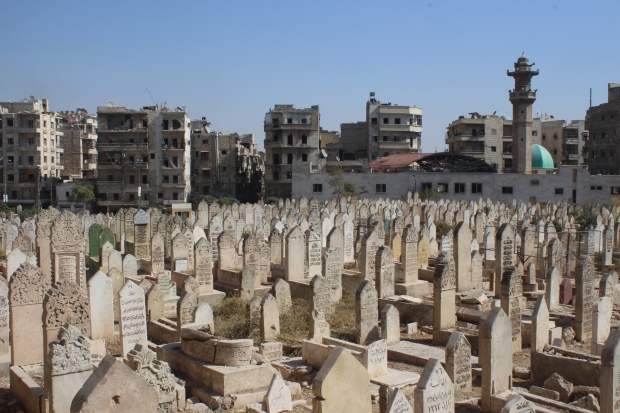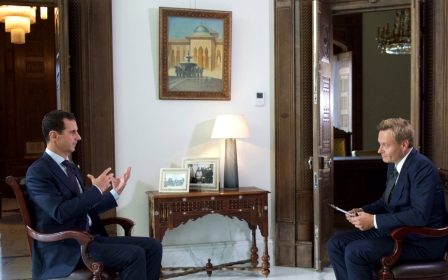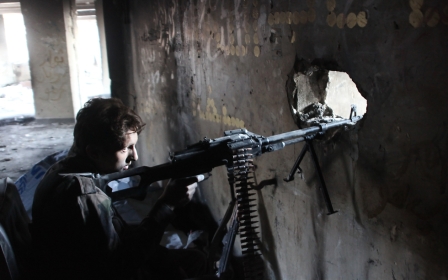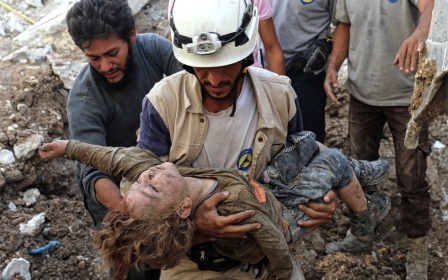'I envy the dead': The living nightmare of Aleppo gravedigger
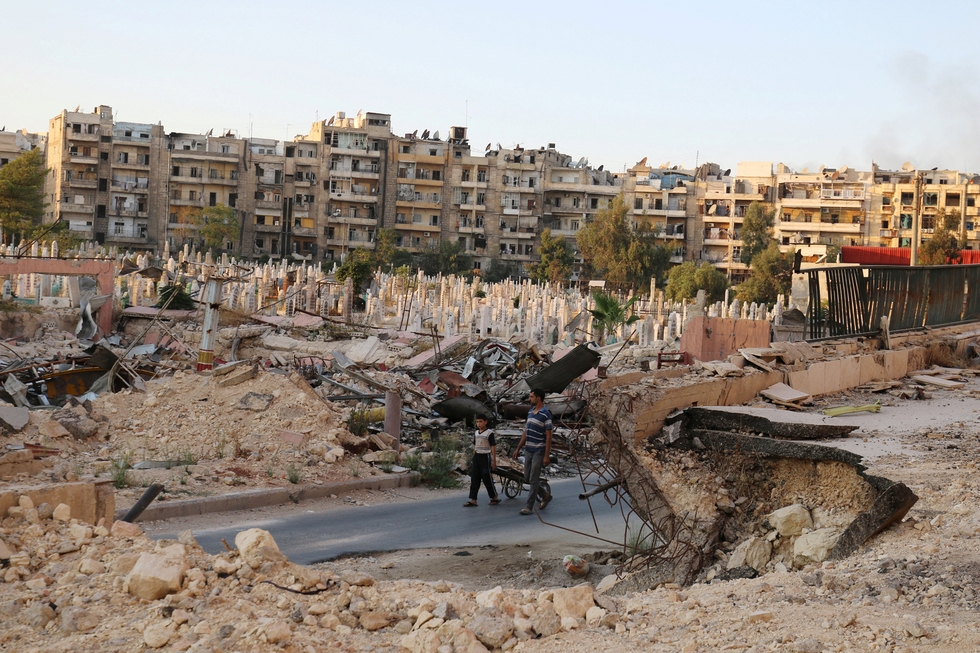
ALEPPO, Syria - Hasan Monir Jakal wipes thick beads of sweat from his brow before hacking away at the soil with his double-edged kreik shovel, as the dry earth beneath him breaks with a crack. He has not eaten for two days, and has had little rest. But there is much work to do.
Before the war, Jakal was a builder in this ancient city. Now he digs graves near his home in Bustan al-Qasr for the hundreds killed in the relentless conflict that rages around him. The graveyards of eastern Aleppo are overflowing. And the work keeps coming.
The 51-year-old has seen everything in these past few weeks of intense attacks by Syrian and Russian forces.
He has worked in the dead of night under the blinding light of white phosphorus bombs, hid as buildings around him crumbled from air attacks and watched the families come and go, consumed by their grief for loved ones lost. And the work keeps coming.
For the gravediggers of Aleppo, there is no time for rest.
"It is miserable, hard work, which only gets harder - on many days I can barely rest, there are often 10 to 20 people to bury, every day," Jakal tells Middle East Eye.
"During the last month we have worked as the shells fell - we could die while we are burying dead and be next to them, but we just keep working. I have a duty."
I would fall down crying when I first saw this but now, living it every day, it’s become unreal.
Rebel-held eastern Aleppo has faced relentless attacks since the failure of the September ceasefire from crude barrel bombs dropped by the air force of President Bashar al-Assad and high-tech weapons launched by his Russian backers.
Moscow has boasted of the "reliability" of its bombs. It is people like Jakal who must deal with their results.
But it is not just the labour that exhausts him. The stream of the dead exacts a heavy toll on his mind.
"A few days ago, a family was pulled from the rubble of their home. It took four days of constant digging to get their bodies out," Jakal said.
"The father wasn’t at home when the attack happened, and he came back to find all of his family was gone.
"He fell beside his daughter's body and wanted to be buried next to her; it was heartbreaking. I was close to tears, but I handled myself and calmed him down, comforting him as much as I could. And then we buried his family.
"I got to know later that he died in another attack and was buried in a different graveyard. He never got his wish. I wish I could have laid him to rest next to his family, but I couldn't.
"Many massacres have taken place around my graveyard. Once two buildings fell on al-Kang street, with more than 15 civilians killed. A petrol station near one of the buildings exploded and devastated the area. The same night we were hit with white phosphorus. We couldn’t sleep that night; it was a waking nightmare.
"In the last three days, it has been a bit calmer and we have managed to catch our breath - but the horrible memories and flashbacks just keep coming to my mind and to my dreams.
"In such a situation I can't fall down crying, which I desperately want to. I have become used to this. I would fall down crying when I first saw this, but now, living it every day, it’s become unreal."
The UN's envoy to Syria, Staffan de Mistura, this week said eastern Aleppo faced being "totally destroyed" if the “cruel, constant” Russian-backed bombing of the city continues.
“The bottom line is in a maximum of two months, two and a half months, the city of eastern Aleppo at this rate may be totally destroyed," he said. "Thousands of Syrian civilians, not terrorists, will be killed, many wounded and thousands will be refugees seeking to escape."
Modar Shekho, a nurse in eastern Aleppo, said even the act of burial was dangerous.
"Graves have been attacked by the regime a number of times," he said. "A year ago, funerals used to happen all the time. Now we wait to do it under the cover of darkness so they don't get attacked."
And finding plots has become a difficult task. Public gardens have been converted to cemeteries to accommodate those who have died, but there is never enough space.
"We try to bury the martyrs directly after they are killed, as is the custom within the Islamic tradition," the nurse said. "But there are no graves anymore. They have all been filled by bodies."
And there is the paperwork. "Before all of this, people planned and bought spaces in the graveyard, paid their money and had the proper documents and rights to their plot," Jakal said.
"That doesn't happen any more, of course. Now we might get a form from a medical centre that confirms the dead person's identity and the relationship to those who brought them, so we can have everything organised as much as possible.
"But the very nature of what is happening means we can't plan, we don't know how many will come, only that they will do so after the barrel bombs fall."
It is, as Jakal said, a waking nightmare.
"It is hard to cope, surrounded by this destruction," he said. "The living are one step, one moment, from the end. I don't think dying is a bad thing anymore, not here.
"I dream of when my time will come, where, and how. Am I going to be buried in rubble, suffocating? These are the questions the living in east Aleppo ask themselves every day. I'd rather be buried than see this.
"I have started to envy the dead; they have found some rest, unlike us.
"And in the morning, when I awake, I see what else has been destroyed, and the new bodies waiting to be buried."
Additional reporting by Areeb Ullah in London
This article is available in French on Middle East Eye French edition.
Stay informed with MEE's newsletters
Sign up to get the latest alerts, insights and analysis, starting with Turkey Unpacked
Middle East Eye delivers independent and unrivalled coverage and analysis of the Middle East, North Africa and beyond. To learn more about republishing this content and the associated fees, please fill out this form. More about MEE can be found here.


